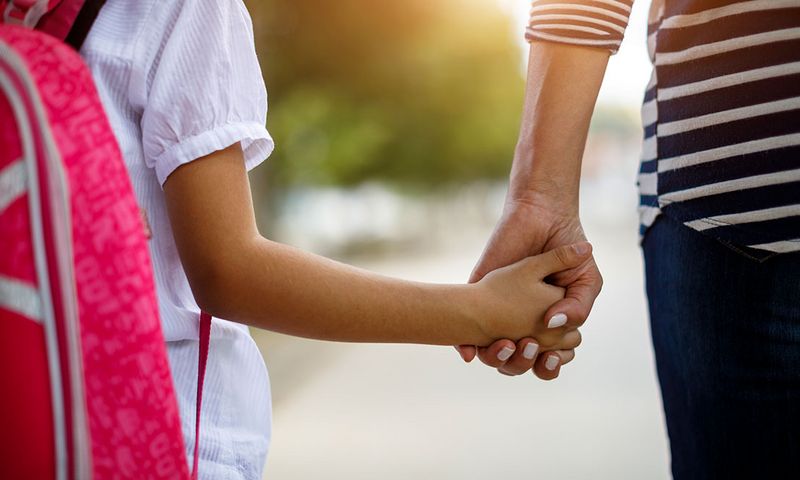
The school shooting at Robb Elementary shocked people all across the country, and talking to your children about the news can feel like a daunting task. Rather than having your kids hear it from unfiltered news or their friends, it’s best if they hear about the scary and tragic news from you, their trusted adult. They might have a lot of feelings and not know how to manage them, and it’s crucial that you can be there for them during this scary time.
Here are some ways you can talk to your child about the shooting in Uvalde, Texas.
Make sure it’s age-appropriate.
Before talking to your children about the school shooting, the first thing you need to consider is their age. Are they old enough to understand? Will telling them details only make them feel more scared? Here are some recommendations for different age groups:
Under 7 years
Young children often understand simple ideas and comprehend the world in more black and white terms. Their life is centered around their family, and any possible threat to family members can cause an immense amount of fear.
When talking to children about the news, ask them what they might already know. You can ask them open-ended questions such as, “What did you hear from school or friends?” or “What do you think is happening?” If they don’t know much, you can say something like, “Someone hurt other people in Texas.” If your kids don’t seem interested in hearing more, then you can simply leave it at that.
Avoid oversharing or overtalking about the issue if your children aren’t asking questions or talking about it with you. After you tell them briefly what’s going on, let them drive the conversation. Do not let them watch the news with you or alone or expose them to social media about the topic.
Your kids may react in various ways, from upset behaviors to apathy. Whichever way they behave after hearing the news, give them space to express themselves as long as they are staying safe and not hurting themselves or others. Validate their feelings and fears but keep reassuring them that police and others are working on helping the situation.
Most of all, remain calm. One of the scariest situations imaginable for children is seeing their trusted adults out of control or upset for an unknown reason. While kids don’t want you to be robotic, expressing your worries, fears, or anger to them will only heighten their panic. Instead, model a calm and controlled demeanor in front of them and express your emotions with other adults at another time.
Keep their daily schedule and let your kids feel secure in their normal routine. But feel free to show them more affection or comfort if they seem more nervous or scared than usual.
Pre-teens and older
Older children and teenagers most likely know more about what’s going on from school, friends, and social media. They can discuss the topic more and might even be exposed to misinformation, which you need to correct.
For older children, you can begin by asking them the same open-ended question: “What do you know about what’s going on?” When they share, you can correct any misinformation they might have heard or check in to see how they’re feeling about it.
If your older ones haven’t heard the news, you can tell them plainly that there was a school shooting in Texas. Assure them that you want them to talk about it with you before they hear it from anyone else. Don’t overload them with information unless they ask for it, and be open with how you’re feeling about it. Sharing your feelings models compassion and empathy for them and encourages them to express themselves.
However, be aware that not all older children may want to discuss the incident. You can encourage them to talk about their thoughts and feelings but respect their process if they need more time for the news to sink in.
Be on the lookout for any signs of traumatic stress, general worry, or anxiety. They might develop irrational or seemingly unrelated fears about school. Validate their feelings and work on ways they can calm themselves during these times of stress. Some examples would be practicing breathing or grounding exercises, calming thoughts, or thinking about what they can and cannot control. However, if their anxiety continues to grow, talk to your pediatrician for advice or next steps.
Conclusion
For all of your kids, it’s important to model calm and thoughtful behavior for them. Younger kids need a strong, reliable adult to trust, while older kids need to see how you process the information in a healthy way.
Keep younger children away from the news and filter the news for your older kids. For teenagers, you can watch the news together and discuss it rather than letting them take in the information independently. You can emphasize the importance of knowing what to do in an emergency and how drills can help them be more prepared and stay calm in a crisis.

Emily currently lives in Orange County, California after spending four years in Illinois and half a year teaching in Florence, Italy. She holds a B.A. in English Literature from Knox College and an M.A. in Counseling from the University of San Diego and has taught English to native speakers and ESL students for over three years. When she’s not working as a School Counselor or writing, she enjoys traveling the world, playing instruments, and blogging about Millennial experiences at Long Live the Twenties.
